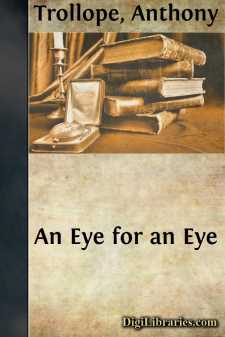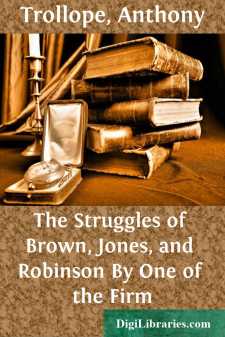Categories
- Antiques & Collectibles 13
- Architecture 36
- Art 48
- Bibles 22
- Biography & Autobiography 813
- Body, Mind & Spirit 142
- Business & Economics 28
- Children's Books 15
- Children's Fiction 12
- Computers 4
- Cooking 94
- Crafts & Hobbies 4
- Drama 346
- Education 46
- Family & Relationships 57
- Fiction 11829
- Games 19
- Gardening 17
- Health & Fitness 34
- History 1377
- House & Home 1
- Humor 147
- Juvenile Fiction 1873
- Juvenile Nonfiction 202
- Language Arts & Disciplines 88
- Law 16
- Literary Collections 686
- Literary Criticism 179
- Mathematics 13
- Medical 41
- Music 40
- Nature 179
- Non-Classifiable 1768
- Performing Arts 7
- Periodicals 1453
- Philosophy 64
- Photography 2
- Poetry 896
- Political Science 203
- Psychology 42
- Reference 154
- Religion 513
- Science 126
- Self-Help 84
- Social Science 81
- Sports & Recreation 34
- Study Aids 3
- Technology & Engineering 59
- Transportation 23
- Travel 463
- True Crime 29
Rachel Ray
by: Anthony Trollope
Description:
Excerpt
THE RAY FAMILY.
There are women who cannot grow alone as standard trees;—for whom the support and warmth of some wall, some paling, some post, is absolutely necessary;—who, in their growth, will bend and incline themselves towards some such prop for their life, creeping with their tendrils along the ground till they reach it when the circumstances of life have brought no such prop within their natural and immediate reach. Of most women it may be said that it would be well for them that they should marry,—as indeed of most men also, seeing that man and wife will each lend the other strength, and yet in lending lose none; but to the women of whom I now speak some kind of marriage is quite indispensable, and by them some kind of marriage is always made, though the union is often unnatural. A woman in want of a wall against which to nail herself will swear conjugal obedience sometimes to her cook, sometimes to her grandchild, sometimes to her lawyer. Any standing corner, post, or stump, strong enough to bear her weight will suffice; but to some standing corner, post, or stump, she will find her way and attach herself, and there will she be married.
Such a woman was our Mrs. Ray. As her name imports, she had been married in the way most popular among ladies, with bell, book, and parson. She had been like a young peach tree that, in its early days, is carefully taught to grow against a propitious southern wall. Her natural prop had been found for her, and all had been well. But her heaven had been made black with storms; the heavy winds had come, and the warm sheltering covert against which she had felt herself so safe had been torn away from her branches as they were spreading themselves forth to the fulness of life. She had been married at eighteen, and then, after ten years of wedded security, she had become a widow.
Her husband had been some years older than herself,—a steady, sober, hardworking, earnest man, well fitted to act as a protecting screen to such a woman as he had chosen. They had lived in Exeter, both of them having belonged to Devonshire from their birth; and Mr. Ray, though not a clergyman himself, had been employed in matters ecclesiastical. He was a lawyer,—but a lawyer of that sort that is so nearly akin to the sacerdotal profession, as to make him quite clerical and almost a clergyman. He managed the property of the dean and chapter, and knew what were the rights, and also what were the wrongs, of prebendaries and minor canons,—of vicars choral, and even of choristers. But he had been dead many years before our story commences, and so much as this is now said of him simply to explain under what circumstances Mrs. Ray had received the first tinge of that colouring which was given to her life by church matters.
They had been married somewhat over ten years when he died, and she was left with two surviving daughters, the eldest and the youngest of the children she had borne. The eldest, Dorothea, was then more than nine years old, and as she took much after her father, being stern, sober, and steady, Mrs....












